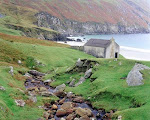Since America just could not tolerate this blatant disregard of innocent lives, the USA had a moral obligation to stop the villians. Yes...so I was told.
As I got older, I learned there are many more factors influencing world events than I was told about as a child. At one point, I became aware of 'false flag' strategies which curdled my warm devotion to the USA,a bastion of the people, for the people, by the people. I have literally choked on the undeniable facts of 911 indicating the complicity (if not complete planning) by the USA government.
Below are more such hard to digest facts: the Lusitania was doing what it was thought to be doing by the Germans - delivering munitions aboard a passenger carrier. How long will it be until this updated information hits the educational texts I wonder?
"The USA entered the first World War opportunistically and under pretenses of
defending democracy. The domestic economy was tanking and needing a boost and so
entering the war with popular support became a necessity. To accomplish this,
the Lusitania, a passenger liner, was used to make munitions deliveries and the
information secretly leaked to the Germans to invite an attack. World War 1 was
a windfall for Americans financiers and so the false flag event of the sinking
of the Lusitania was a well crafted strategy."
Shhhh....that's conspiracy theory. So I doubt the truth will ever be printed in text books. Yet it matters not to all those soldier ants who died for the lie. If you think this account lacks validity, I urge you to read the writings of
For an alternate point of view with links, Sinking of the Lusitania 7 May 1915
.
Its always good to compare versions.
Secret of the Lusitania

Arms find challenges Allied claims it was solely a passenger ship
Sam Greenhill
December 26, 2008
Source
Her sinking with the loss of almost 1,200 lives caused such outrage that it propelled the U.S. into the First World War.
But now divers have revealed a dark secret about the cargo carried by the Lusitania on its final journey in May 1915.
Munitions they found in the hold suggest that the Germans had been right all along in claiming the ship was carrying war materials and was a legitimate military target.
Doomed: A contemporary view of the sinking of the Lusitania off Ireland in May 1915
The Cunard vessel, steaming from New York to Liverpool, was sunk eight miles off the Irish coast by a U-boat.
Maintaining that the Lusitania was solely a passenger vessel, the British quickly accused the 'Pirate Hun' of
slaughtering civilians.
The disaster was used to whip up anti-German anger, especially in the U.S., where 128 of the 1,198 victims came from.
A hundred of the dead were children, many of them under two.
Robert Lansing, the U.S. secretary of state, later wrote that the sinking gave him the 'conviction we would ultimately become the ally of Britain'.
Americans were even told, falsely, that German children were given a day off school to celebrate the sinking of the Lusitania.
The disaster inspired a multitude of recruitment posters demanding vengeance for the victims.
One, famously showing a young mother slipping below the waves with her baby, carried the simple slogan 'Enlist'.
Two years later, the Americans joined the Allies as an associated power - a decision that turned the war decisively against Germany.
The diving team estimates that around four million rounds of U.S.-manufactured Remington .303 bullets lie in the Lusitania's hold at a depth of 300ft.
The Germans had insisted the Lusitania - the fastest liner in the North Atlantic - was being used as a weapons ship to break the blockade Berlin had been trying to impose around Britain since the outbreak of hostilities in August 1914.
Winston Churchill, who was first Lord of the Admiralty and has long been suspected of knowing more about the circumstances of the attack than he let on in public, wrote in a confidential letter shortly before the sinking that some German submarine attacks were to be welcomed.
He said: 'It is most important to attract neutral shipping to our shores, in the hope especially of embroiling the U.S. with Germany.
'For our part we want the traffic - the more the better and if some of it gets into trouble, better still.'
Hampton Sides, a writer with Men's Vogue in the U.S., witnessed the divers' discovery.
He said: 'They are bullets that were expressly manufactured to kill Germans in World War I - bullets that British officials in Whitehall, and American officials in Washington, have long denied were aboard the Lusitania.'
The discovery may help explain why the 787ft Lusitania sank within 18 minutes of a single German torpedo slamming into its hull.
Some of the 764 survivors reported a second explosion which might have been munitions going off.
Gregg Bemis, an American businessman who owns the rights to the wreck and is funding its exploration, said: 'Those four million rounds of .303s were not just some private hunter's stash.
'Now that we've found it, the British can't deny any more that there was ammunition on board. That raises the question of what else was on board.
'There were literally tons and tons of stuff stored in unrefrigerated cargo holds that were dubiously marked cheese, butter and oysters.
'I've always felt there were some significant high explosives in the holds - shells, powder, gun cotton - that were set off by the torpedo and the inflow of water. That's what sank the ship.'
Mr Bemis is planning to commission further dives next year in a full-scale forensic examination of the wreck off County Cork.



No comments:
Post a Comment